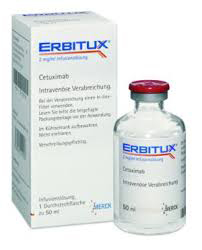Drug Type:
Erbitux is a targeted therapy. It is classified as a "monoclonal antibody" and "signal transduction inhibitor" by binding to epidermal growth factor receptors (EGFR). (For more detail, see "How Erbitux Works" section below.)
What Erbitux Is Used For:
♦ Erbitux is used to treat metastatic colorectal cancer (cancer spread beyond the colon or rectum) that over-expresses the epidermal growth factor receptor (EGFR).
♦ Approved for the treatment of squamous cell carcinoma of the head and neck.
Note: If a drug has been approved for one use, physicians may elect to use this same drug for other problems if they believe it may be helpful.
How Erbitux Is Given:
♦ By intravenous (IV) infusion.
♦ The amount of cetuxumab that you will receive depends on many factors, including your height and weight, your general health or other health problems, and the type of cancer or condition being treated. Your doctor will determine your dose and schedule.
Dosage is for either monotherapy or in combination
Loading Initial dose: 400 mg/m² IV infused over 2 hr
Maintenance: 250 mg/m² IV infusion over 60 min qWeek until disease progression or unacceptable toxicity
Complete cetuximab administration 1 hr prior to FOLFIRI
Not to exceed infusion rate of 10 mg/min
Important things to remember about the side effects of cetuxumab include:
- • Most people do not experience all of the side effects listed.
- • Side effects are often predictable in terms of their onset and duration.
- • Side effects are almost always reversible and will go away after treatment is complete.
- • There are many options to help minimize or prevent side effects.
- • There is no relationship between the presence or severity of side effects and the
effectiveness of Erbitux.
These side effects are less common side effects (occurring in about 10-29%) of patients receiving Erbitux:
- • Nausea and vomiting
- • Diarrhea
- • Constipation
- • Poor appetite
- • Headache
- • Abdominal pain
- • Nail disorder - inflammation of the skin surrounding a fingernail or toenail
- • Mouth sores
- • Swelling
- • Difficulty sleeping
- • Itching
- • Low red blood cell count (Anemia)
- • Cough

